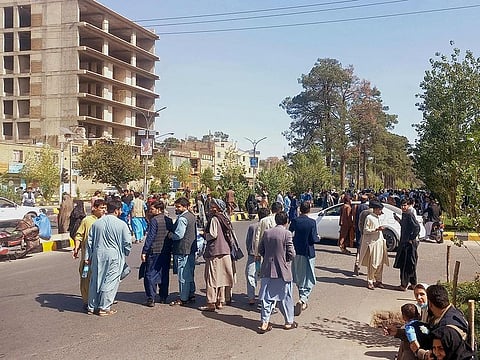6.3 magnitude earthquake in western Afghanistan kills 'about 120'
Four villages in the Zenda Jan district in Herat province bore the brunt of the quakes

Herat: The death toll from a magnitude 6.3 earthquake in western Afghanistan on Saturday has risen to "about 120", disaster relief authorities said, with more than 1,000 others being treated for injuries.
The United States Geological Survey said the epicentre was 40 kilometres northwest of the region's largest city Herat, and was followed by eight aftershocks with magnitudes between 4.3 and 6.3.
"So far, more than 1,000 injured women, children, and old citizens have been included in our records, and about 120 people have lost their lives," Herat province disaster management head Mosa Ashari told AFP.
Crowds of residents fled buildings in Herat at around 11:00 am (0630 GMT) as the quakes began.
"We were in our offices and suddenly the building started shaking," 45-year-old resident Bashir Ahmad told AFP.
"Wall plasters started to fall down and the walls got cracks, some walls and parts of the building collapsed," he said.
"I am not able to contact my family, network connections are disconnected. I am too worried and scared, it was horrifying."
Men, women and children stood out in the wide streets, away from tall buildings, in the moments after the first quake and remained wary of returning to their homes as aftershocks rumbled for hours.
"The situation was very horrible, I have never experienced such a thing," said 21-year-old student Idrees Arsala, the last to safely evacuate his classroom as the quakes began.
'Buried under the rubble'
Early on Saturday evening, disaster management authority spokesman Mullah Jan Sayeq told AFP that the number of fatalities was expected "to rise very high".
"There are some areas that are totally collapsed and all the houses are damaged," he said. "People are still buried under the rubble. The aid agencies are trying to reach the area."
Hundreds of fatalities were possible, according to a USGS preliminary estimate.
"Significant casualties are likely and the disaster is potentially widespread. Past events with this alert level have required a regional or national level response," it said.
The USGS had earlier reported the first quake's magnitude as 6.2. It had a shallow depth of just 14 kilometres, it said.
Herat - 120 kilometres east of the border with Iran - is considered the cultural capital of Afghanistan.
It is the capital of Herat province, which is home to an estimated population of 1.9 million, according to 2019 World Bank data.
Afghanistan is frequently hit by earthquakes, especially in the Hindu Kush mountain range, which lies near the junction of the Eurasian and Indian tectonic plates.
In June last year, more than 1,000 people were killed and tens of thousands left homeless after a 5.9-magnitude quake - the deadliest in Afghanistan in nearly a quarter of a century - struck the impoverished province of Paktika.
In March of this year, 13 people were killed in Afghanistan and Pakistan by a magnitude 6.5 quake, which hit near Jurm in northeastern Afghanistan.
Sign up for the Daily Briefing
Get the latest news and updates straight to your inbox



